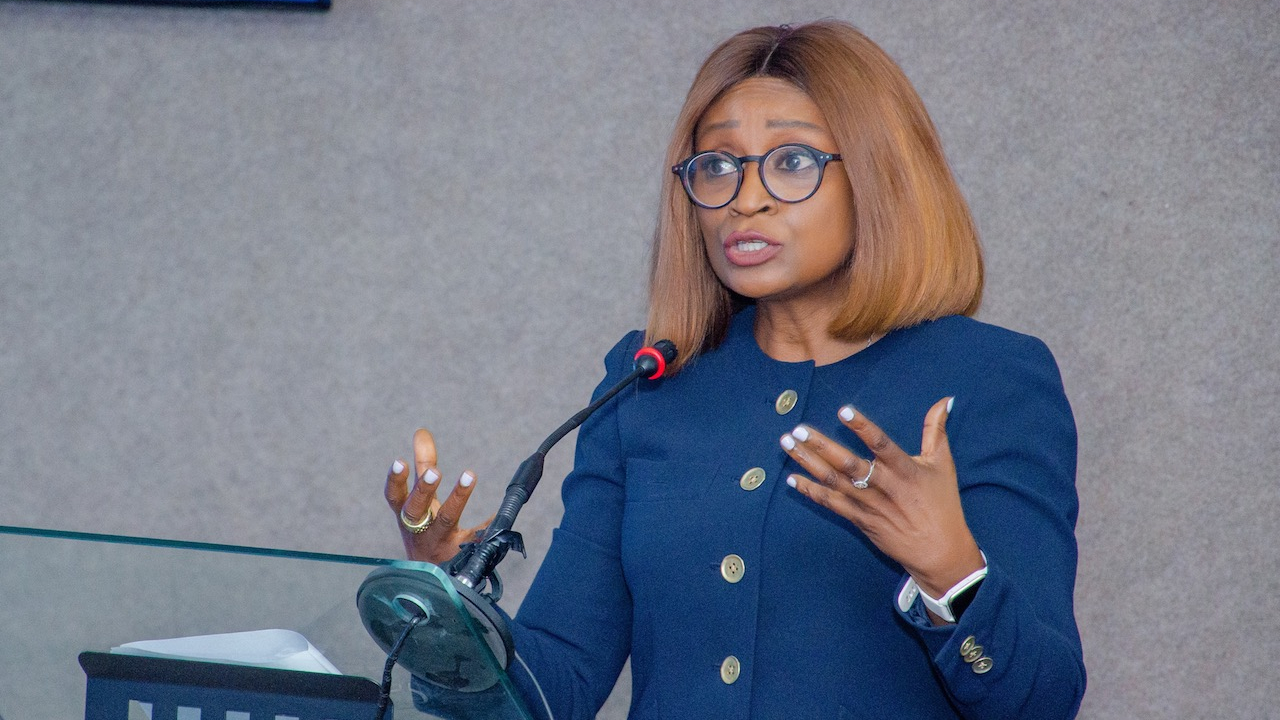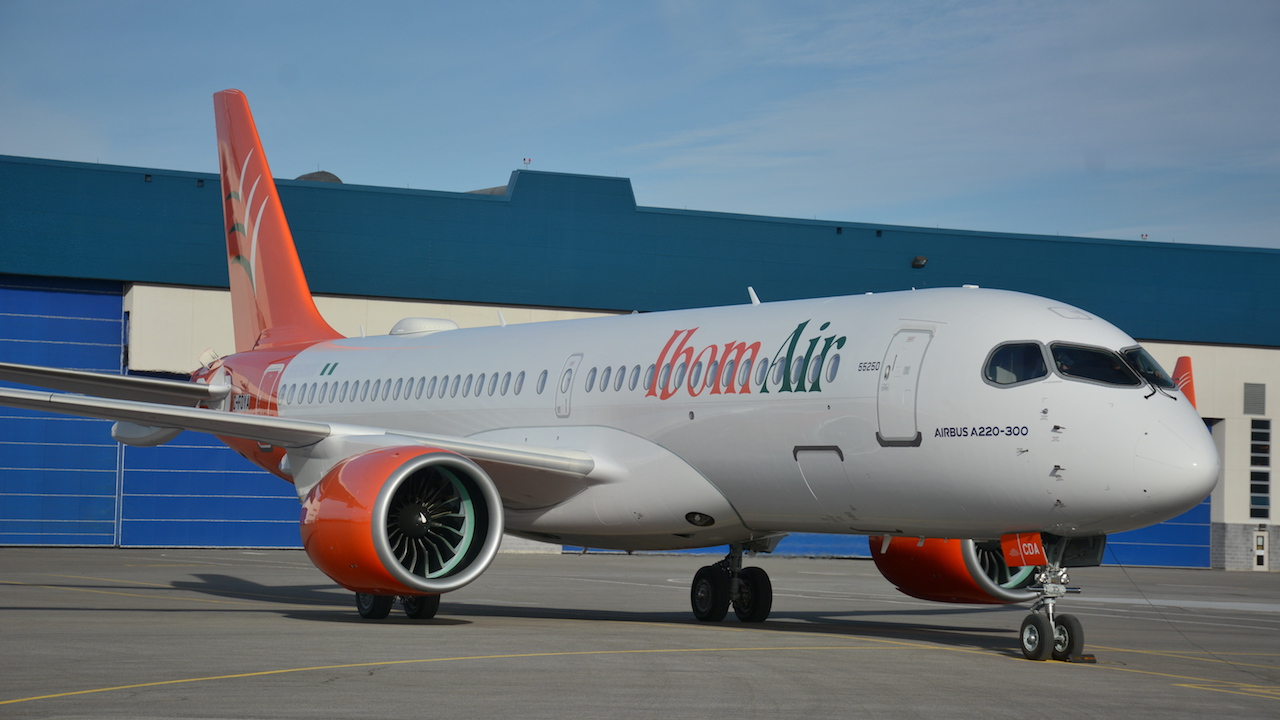Marathon Woman
Following her re-election for a second term as the secretary general of the African Civil Aviation Commission (AFCAC), Adefunke Adeyemi talks about the commission’s work, and especially the slow progress towards a single African market.

Adefunke Adeyemi: "It is a marathon not a sprint to get SAATM over the line. It is all of those little steps that are being taken that cotribute towards its achievement." Image: AFCAC
“People think about SAATM [Single African Air Transport Market] and the liberalisation agenda of Africa as a big bang, that one day we're just going to wake up and everything is going to be fixed and the whole continent is going to be connected overnight.
“But it’s not like the big bang theory,” said Adefunke Adeyemi, AFCAC secretary general speaking about the creation of a liberalised air transport market across the continent’s 55 states.
She would love nothing better than the swish of a magic wand to usher SAATM in, but political and operational realities in Africa means it is a marathon not a sprint to get SAATM over the line. “It is all of those little steps that are being taken that contribute towards its achievement,” she explained.
Adeyemi was elected to the post of secretary general in September 2022 on a ticket to bring fresh impetus to AFCAC and SAATM. How does she judge the progress being made by her team?
“We like to think that we're making progress,” she asserted. “Number one, we have facilitated an increase in connectivity supported through the different interventions. There have been 97 new routes started over the past two years, 18 of them being fifth freedom routes.
“We have supported the regulatory environment through a YD [Yamassoukro Decision] compliant air service agreement template and guidelines for granting market access between countries. We're supporting through guidelines on economic regulation; we're supporting through engagements with our regional economic communities. We're supporting through reducing the non-physical barriers and mediating market access issues between states and with industry.”
The key word here is support, or facilitation, because AFCAC is the African Union’s specialised agency for all civil aviation matters on the African continent and the executing agency of the Yamassoukro Decision (YD) and SAATM and is not a civil aviation authority in its own right.
The YD is a declaration made in 1988 to liberalise Africa’s air transport market. However, for years it was not much more than that – a declaration.
The African Union launched SAATM in 2018 as a flagship project of its ‘Agenda 2063’ to create a single unified air transport market in Africa to advance the liberalisation of civil aviation in Africa under the YD and to act as an impetus to the continent’s economic integration agenda.
However, it is a slow process and Adeyemi, strongly backed by African governments to win the re-election to the AFCAC post, has the energy and experience to get it moving.
Defining a strategy
Adeyemi’s political sensibilities means she does not criticise her predecessors as she took the reins at AFCAC. However, there was clearly a need for refocus and reset to “ensure that we are able to fulfil our mandate”.
“In year one it was important to take a strategic approach, to build on the shoulders of those who had come before me, both at SG and at Bureau level, to build a strong institution, build a strong team, create strong core initiatives, as well as to build good visibility and a good brand and reputation for AFCAC,” she said.
The AFCAC Commission went on an all-important retreat in early 2023 to thrash out the plan. “We looked at our strategic priorities and identified them with clear, measurable targets on what we wanted to achieve and what we wanted to deliver,” she explained. This process has been repeated in 2024 and with the new Bureau in 2025.
While this interview focuses on the SAATM priorities, AFCAC’s mandate reaches across Safety, Security, Infrastructure, Sustainability and Skills development (see box story).
These are appropriately prioritised in AFCAC’s work, but the overarching importance of single African skies cannot be overstated. “I believe that SAATM, under the framework of the YD, is the single most important developmental imperative for Africa’s socio-economic development,” said Adeyemi.
Africa is missing the role air transportation plays in other parts of the world to create a better integrated and more prosperous continent, she said. “Aviation is seriously underdeveloped for two main reasons, one, because it is not necessarily seen as a strategic pillar of development in most countries in Africa,” she said.
"Secondly, we need to transition aviation from being seen as a sort of luxury to a pillar of development for the masses.” This requires a mindset shift with aviation still viewed by many as elitist or unattainable.
The launch of SAATM-PIP
An initiative to fast-track YD implementation through SAATM was born after the brainstorming session between Adeyemi and her team just two months after she joined in November 2022. This built on work she had helped foster during her dozen years at IATA where she was regional director, advocacy and strategic relations, Africa until she joined AFCAC.
“We talked about what can we do to transform this issue of YD and SAATM and really get some traction around it. What we recognised was that all 55 countries of Africa cannot go at the same time and the same pace,” she explained. “So, we said those who are ready, willing and able, let us go with that.”
The SAATM pilot implementation project was invented. “The target and the idea were about accelerating the implementation of the YD. It was not to come up with yet another acronym or another initiative. We came up with this approach where we're looking at clusters of countries to see how connectivity can improve across different parts of Africa and to support that.”
Since the SAATM-PIP was launched, 21 countries have signed up to take part representing over 80 per cent of the market in passenger numbers. These countries are put into six clusters.
While signing up and implementation are different things, over the past two years a total of eight PIPs have taken place, said Adeyemi.
A PIP is a highly-involved affair, with the highest-level stakeholder being a country’s president. This essential buy-in brings the commitment of a huge array of stakeholders from government, with ministries responsible for transport/aviation, trade, finance, interior, tourism, and information.
A cast of operational stakeholders join from airports, airlines, ANSPs, ground services, immigration, customs, revenue authorities and tourism boards.
Using the example of the July 2024 PIP, held in Sierra Leone, “the focus of the SAATM-PIP Airshow is to ensure that the selected states in the cluster align their respective Air Service Agreements (ASAs) with the AFCAC YD-compliant ASA template in order to promote new Fifth Freedom traffic penetration and remove or reduce impediments to the full and sustainable implementation of SAATM.”
The PIP also promotes the use of YD/SAATM regulations and revised African Civil Aviation Policy (AFCAP) and ASA guidelines with non-African partners.
The first PIP was held in AFCAC’s home base of Senegal, with others held in Nigeria, Ethiopia, Namibia, Mozambique, Gambia and Sierra Leone. South Africa is being prepared for a PIP, while Egypt, Zambia and Uganda are on the list this year too, said Adeyemi.
Support role
She is careful to explain that AFCAC’s role is one of facilitation, guidance and engagement: “We say there is a starting point and that is market access. If you are going to grant it, here is the template that is compliant with the YD. We have set up a dispute settlement mechanism, we have competition and consumer protection regulations which are the rules of engagement for the SAATM.”
A PIP taking place doesn’t guarantee states will open markets, but there have been tangible results with the 97 new routes, of which, importantly, 18 are Fifth Freedom ones. These are international routes where the airline adds a leg of the service to a third country.
While the aim is to foster direct services, the reality of Africa, with low traffic volumes and thin routes, means Fifth Freedoms are critical to “mop up traffic along the way and make operating routes viable,” said Adeyemi.
Following the launch of the SAATM-PIP, AFCAC began fine-tuning the approach during 2024 to increasingly involve the AU’s existing Regional Economic Communities blocs, she explained. For example, the Sierra Leone PIP invited all members of the Banjul Accord group of states, which features seven West African nations that already have a multilateral agreement between them.
AFCAC has a target to increase traffic through Fifth Freedom routes between and across the cluster of countries working through the SAATM-PIP methodology to 30 per cent by 2027, she noted. It has already risen from 15 per cent in 2019 to 21 per cent in 2024.
State support
At the Aviation Africa Summit, held in Johannesburg in September 2024, Poppy Khoza, director of civil aviation, South African Civil Aviation Authority, called for AFCAC to be given the “teeth” to drive pan-African air transport liberalisation and implement SAATM.
Adeyemi welcomed such support. “We are starting to see a very important and significant change, not just in the mindset, but also in the policy and decisions that are being taken across our states.”
This accelerated following AFCAC’s strong advocacy drive across the continent in the past couple of years, delivered increased technical assistance to states and seen the launch of the SAATM-PIP process.
However, Adeyemi acknowledged that not all countries are ready for this aviation fast-track: “For many, aviation is not top of the agenda. It may be food, or education or security. For some these are the fundamentals right now. At cabinet level, aviation is not necessarily given that prioritisation that it deserves.”
For her it is critical that AFCAC creates an enabling environment for those who do want to prioritise aviation.
And with another term secured she has the backing to carry on. “We continue with our work, using our doggedness and slogging it out, continuing the advocacy and changing the mindset,” she said. “That is going to get us where we need to be.”
Stay up to date
Subscribe to the free Times Aerospace newsletter and receive the latest content every week. We'll never share your email address.


